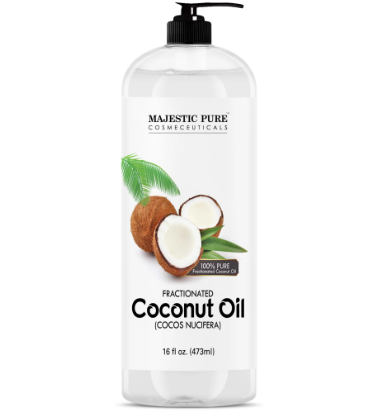Picture this: It's a beautiful summer day, and you're lounging on the beach, soaking up the sun's warm embrace. The waves crash gently on the shore, and the sound of seagulls fills the air. You're having the time of your life even you have applied a lot of sunscreen, but you might have overdone it just a bit. The result? A nasty sunburn that leaves your skin feeling hot, tight, and painful. That's when I stumbled upon a surprising remedy – coconut oil.
My Experience with Coconut Oil and Sunburns
One sunny afternoon, I found myself in this very situation, nursing a particularly nasty sunburn. Desperate for relief, I rummaged through my beach bag in search of something, anything, to soothe my tormented skin. And there it was, a small bottle of coconut oil that I had brought along for my hair and skin. Desperation drove me to give it a try, and the results were nothing short of miraculous.
Here, I share my experience and delve into the surprising benefits of using coconut oil on sunburns.
Immediate Cooling Effect
One of the most noticeable benefits of applying coconut oil to a sunburn is the instant relief it provides. As soon as I gently massaged the oil onto my skin, I felt a soothing and cooling sensation. It was as if a gentle breeze had kissed my sunburned skin. This immediate relief was a godsend, as sunburns can be incredibly uncomfortable.
Hydration and Moisture
Sunburned skin tends to become dry, flaky, and dehydrated. Coconut oil, being rich in fatty acids, is an excellent natural moisturizer. It helps to restore the skin's moisture balance, preventing it from peeling and becoming even more painful. My skin started to feel less tight and more supple after just a few applications.
Anti-Inflammatory Properties
Coconut oil contains compounds with anti-inflammatory properties, such as polyphenols and lauric acid. These substances can help reduce redness and swelling associated with sunburns. After a few days of consistent use, I noticed that my sunburned skin had visibly less redness and inflammation.
Speedy Healing
Perhaps one of the most remarkable benefits of using coconut oil on sunburns is its ability to promote faster healing. The antioxidants in coconut oil aid in repairing damaged skin cells, while its natural antibacterial properties help protect against infections. My sunburn started to heal much faster than I had expected, and the discomfort decreased with each passing day.
Reducing the Risk of Peeling
One of the most annoying aspects of sunburn is the inevitable peeling that often follows. Coconut oil can help minimize this by keeping the skin well-moisturized and supple. While I did experience some peeling, it was noticeably less severe than previous sunburns, thanks to my diligent use of coconut oil.
How to Use Coconut Oil for Sunburns
Using coconut oil for sunburn relief is simple:
Cleanse: Gently clean the sunburned area with cool water and a mild, fragrance-free soap. Pat it dry with a soft towel.
Apply Coconut Oil: Take a small amount of coconut oil and massage it onto the sunburned skin. Be gentle to avoid further irritation.
Repeat: Reapply the coconut oil every few hours or as needed for relief. Consistency is key to maximize its benefits.
Stay Hydrated: Remember to drink plenty of water to keep your body hydrated from the inside out.
Conclusion
In my experience, using coconut oil on sunburns was nothing short of a revelation. Its immediate cooling effect, hydrating properties, anti-inflammatory benefits, and ability to promote faster healing all contributed to a more comfortable and speedier recovery.
While coconut oil can be a valuable addition to your sunburn relief toolkit, it's essential to remember that prevention is the best way to avoid sunburn altogether. Always wear sunscreen with sufficient SPF, protective clothing, and seek shade during peak sun hours.
Next time you find yourself nursing a sunburn, consider reaching for the coconut oil. You might just be as pleasantly surprised as I was by the soothing and healing benefits it offers.
.png)








